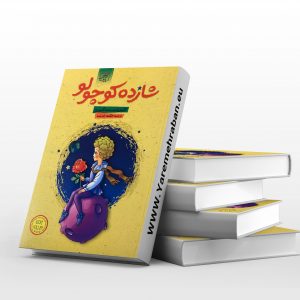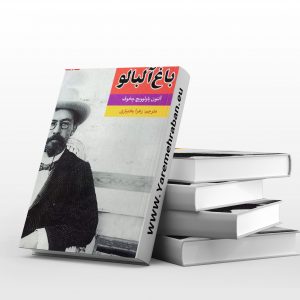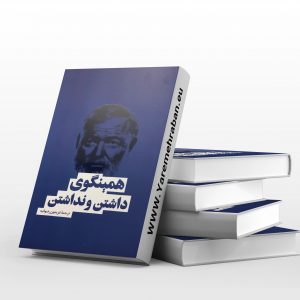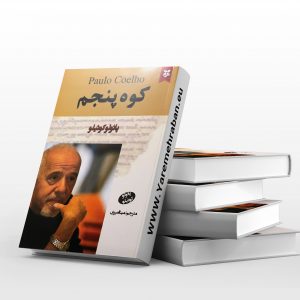Description
Introduction of Saadi’s Bustan book
Saadi Park or Saadi Letter is the first work of Saadi, the composition of which was completed in 655 AH. Saadi composed this work while he was traveling and presented it to his friends when he returned to Shiraz. This work has been composed in the form of Masnavi and in the convergent sea and is epic in terms of format and weight of poetry, although it has dealt with ethics, education, politics and societies in terms of content.
Saadi “Bustan” or “Saadi Nameh” is the first work of Saadi, a famous Iranian poet and sage, whose composition was completed in 655 AH.
Sheikh Mosleh al-Din Saadi Shirazi composed this work while he was traveling and presented it to his friends when he returned to Shiraz. This work has been composed in the form of Masnavi and in the convergent sea, and it is an epic poem in terms of format and weight, although it has dealt with ethics, education, politics and societies in terms of content. An important feature of this psychological work and its simplicity of language along with the deep moral and legal meanings of the ruling that Sheikh Shiraz refers to in the anecdotes.
Saadi Bustan’s book consists of an introduction (preface) and ten chapters, which are arranged as follows:
Introduction
Chapter One – In Justice and Prudence and Vote
Chapter Two – In Ehsan
Chapter Three – In Love and Drunkenness and Passion
Chapter Four – In Humility
Chapter Five – In Reza
Chapter Six – In Satisfaction
Chapter 7 – In the world of education
Chapter Eight – In Sugar on Wellness
Chapter 9 – In repentance and the way of righteousness
Chapter 10 – In the prayers and the end of the book
This book has about four thousand verses, and Sa’di called it “Atabak Abu Bakr ibn Sa’d Zangi”. Many descriptions have been written on this book and of course many copies have been reprinted from it, including the live proofread version of the memory of Mohammad Ali Foroughi and the proofreading version with annotations and confrontation with other manuscripts by the late Dr. Gholam Hossein Yousefi (Kharazmi Publications). Books are counted.
Sample poems of Saadi Park
I remember one night when I could not see my eyes, the butterfly said with a candle:
If I love you, why do you cry and mourn?
Say, my poor fan, my sweet friend Angbin has gone
When sweets leave me, when Farhadam is on fire
He said everything and every moment a flood of pain ran down his yellow face
Claimant! Love is not your job that you have neither patience nor endurance
You run away from a raw flame, my masters, to burn it all
You were burned by the fire of a loving lover, you saw me burning from head to toe
The rest of the night is still full of lamentation
Hemi said and smoked that this is the end of love, boy
If you love to learn to kill the vulva of burning
Saadi Park in other languages
Garcنn Dutassi was the first to completely return Saadi Park to France in 1859. After him, other translators translated this work into French, the most famous of which is Nicola’s Janabatist, Barbie Domnar.
Saadi Park was published for the first time 130 years ago and for the second time in its entirety these days by Walstein Publishing House in 472 pages in German. This book was published in collaboration with Hafez and Goethe in Bonn, Germany and was edited by Jalal Rostami.
A leaflet from Saadi Park written in Bukhara in 1539. This valuable work is now housed in the Nelson Atkins Museum of Art in Kansas City, USA.
Who was Saadi?
Saadi Shirazi, one of the great Persian poets of all times, was born in Shiraz in the 13th century AD. He is one of the most influential poets in the medieval period of Iran, who is praised for displaying his art in expressing the deepest moral and social ideas in the simplest words for all people of all ages. He is known as a “master of speech” among Iranian scholars and one of the best poets of classical Persian literature. His two outstanding literary masterpieces are Bustan and Golestan.
The exact date of his birth is not known, but according to his poems, he was probably born in 606 AH, which was contemporary with the Mongol invasion of Persia. Golestan, written in 1258, introduced himself as a 50-year-old man. However, very little information is still available about his birth and personal life.
After leaving Shiraz, he went to Nizamiyah University in Baghdad to study Islamic sciences, theology, law, history and Arabic literature. He traveled to various countries such as Anatolia, Syria, Egypt and Iraq for thirty years. He also visited Jerusalem, Mecca and Medina. Saadi wrote his travels and adventurous life in the form of two books, Bustan and Golestan.
Ustad Sokhan is said to have been captured by the Crusaders in the city of Acre and imprisoned for seven years with a group of Sufis who fought against the Crusaders in Aleppo. But like many of his other stories, such as A Journey to India and Central Asia, this cannot be honestly confirmed. But without a doubt, he lived all his life as a wandering dervishes.
His other works include lyric poems (love poems and sonatas), ode poems (heroic melodic poems or chakamehs), quatrains and short pieces of Saadi prose and sermons in both Persian and Arabic.
Saadi has composed about 700 gazelles, which are mainly romantic and mystical in nature. In his works, he used irony (indirect expression) to express and criticize the shortcomings and corruption in the society of his time.
Saadi was a man who was very interested in learning and traveling. He spoke with various groups of intellectuals, merchants, preachers, farmers, ordinary people, and survivors of the Mongol invasion of the tombs of dervishes and even thieves in remote areas. With great effort to study the state of society, he guided people to wisdom and a tendency towards morality.
He finally returned to Shiraz before 1257 AD, when he had finished his book Bustan. Apparently, he spent the rest of his life in his hometown of Shiraz, and until the end of his life, he was highly respected by the government of the time and the people. Saadi was called Sheikh because of his great knowledge. He died between 1291 and 1294 AD in Shiraz.
Introducing the beauties of Saadi Park
The garden was known in early sources as Saadi Nameh; A moral and mystical work that includes 4000 verses of poetry in the form of Masnavi, which was completed by Sheikh Mosleh ibn Abdullah alias “Saadi” in 655 AH (1257 AD) and dedicated to Abu Bakr ibn Sa’d Zangi (ruler of Persia).
This date is given by Saadi in the introduction of the book. Bustan Saadi is a very famous poem in Persian literature that in many ways has a higher value than Golestan, which was written a year after Bustan.
In both books, there is a very high standard of elegance, philosophy, thought and effectiveness at all levels, but there is no doubt that Bustan has a new purpose and tone. Of the 183 anecdotes quoted in this book, many have been narrated in an argumentative manner. This important part, although expressed in the book generally on the basis of thought and in the form of advice, is somewhat philosophical.
The garden can be presented as a pattern of behavior that is a real and practical paradoxical combination with mysticism and thought; It literally includes practical ethics (ie, moral rules that are enforceable). Especially in the first chapter of the book, where Saadi addresses the rulers and other powerful people of his time with eloquence and courage.
However, some domestic critics believe that Saadi portrayed his personal and mental views, which are not true in all moral and philosophical fields, but what is clear is that he was a very respectable person and the nature of his work was written with all his heart. Is; But anything that may have stemmed from his learning, wisdom, mystical passion, and adventure is more about his creativity in tidying up the garden. In other words, the discussion of the story is told in a clear, humorous and very convincing way in the form of poetry.
This is the last and highest quality in classical Islamic literature
(Even works of prose) is found to be quite abstract and ideal. In the park, Saadi has a clear view of the world and describes it accurately.
Indeed, as a poet in the seventh century, thousands of miles away today, he has been able to interpret many cultural changes in his book. Another notable aspect of Saadi Park is the attention to initiative that the poet has almost always succeeded in.
Saadi Bustan’s book is mostly inspired by praising God, the commands and words of the Qur’an and the actions of the Prophet (PBUH), which is mixed with the poet’s personal point of view and is written in a very delicate and attractive way. This book is a complete combination of moral wisdom and the melodic words of Persian poetry.
Is Saadi Park an order or prose?
The book Bustan is written in order and its poetic format is Masnavi and it is composed like Ferdowsi’s Shahnameh in the convergent sea. The melodic state of the verses indicates the existence of order in the poems of the book, so the book has a very beautiful tone.
How many chapters does Saadi Park have?
The book of the garden is arranged in ten chapters or chapters, the titles of which are actually mentioned in the introduction. Each title is at least an approximate guide to explaining the point.
– In justice, good management of affairs and correct judgment
– In goodness (for example, benevolent deeds)
– In love, drunkenness and passion
– In humility
– In acceptance (ie the will of God)
– In satisfaction (for example, with limited assets)
– In spiritual education (about self-limitation or control)
– In education
– In repentance and considering the right path
– In close contact with God (prayers)
– The end of the book
Saadi Bustan has been edited by many people so far, the most famous and best of which has been done by Mohammad Ali Foroughi and Gholam Hossein Yousefi.
Examples of the most famous anecdotes of Saadi Park
1. The first chapter in justice, good management of affairs and correct judgment – the story of the harassment of people
A passer-by had fallen into a well from which a male lion was perishing
Think that people do not see anything but bad and do not see themselves as more helpless
All night long, someone shouted at him and shouted:
Did you ever hear the cry of someone you want to shout today?
۲. The second chapter is about Nikki – the story of Mamask and the illegitimate child
One went and took a hundred thousand dinars from him
Not because Mamaskan took the gold, because the freedmen took it from him
You were not an empty dervish, you were a traveler to his inn
He made his own heart and the heart of a stranger happy, not like a father, he tied a wire and gold
3. Chapter 3 in love, drunkenness and passion – an anecdote in the sense of overcoming ecstasy and the reign of love
One had a witness in Samarkand who said he had sugar instead of Samar
Jamali is taken hostage by the sun because of her joke
God Almighty from good to the end that you think of the mercy of the verse
You went and the visions in front of your friends’ hearts made you cringe
4. Chapter Four in Humility – The Story of Loghman Hakim
I heard that Loghman was a black man, not a bodybuilder and thin
One of his servants thought he had a tongue and had a flower in his work
He was persecuted and made it with his kindness and anger
When he came, the servant left, and Nahibi Faraz came from Loghman again
5. Chapter Five in Acceptance – The Story of a Dervish Man and a Rich Neighbor
His name was Bakhtiar, a strong man and a capitalist
It was home to the beggars’ dormitory
When a dervish sees a rich man, he needs more heat
A woman joined the war with her show at night
6. Chapter Six in Satisfaction – The story of a short-sighted man and a great woman
One had a toothache. The father was thinking
Where do I get bread and leaves? I do not want to leave it
Poor Chu said this, look at the couple to see how masculine his wife said:
The devil is terrified to give life to the one who gives teeth and gives bread
7. Chapter 7 in Spiritual Education – Speech in the Virtue of Silence
If the foot of the mountain rises from the sky in glory
Understand the language of a man who knows very well that tomorrow is not a pen without a tongue
The oyster-like gemologists did not open the secret of the mouth except to the pearl
It is abundant to speak and the listener should not listen to advice except in silence
8. Chapter 8 in education – an anecdote in the meaning of sweet sugar
The descendants of the horse Adham fell on the neck of the door
Chou Pilsh sank from neck to toe, head to body
1- Introducing the book on YouTube
2- Introducing the book in Aparat














Reviews
There are no reviews yet.